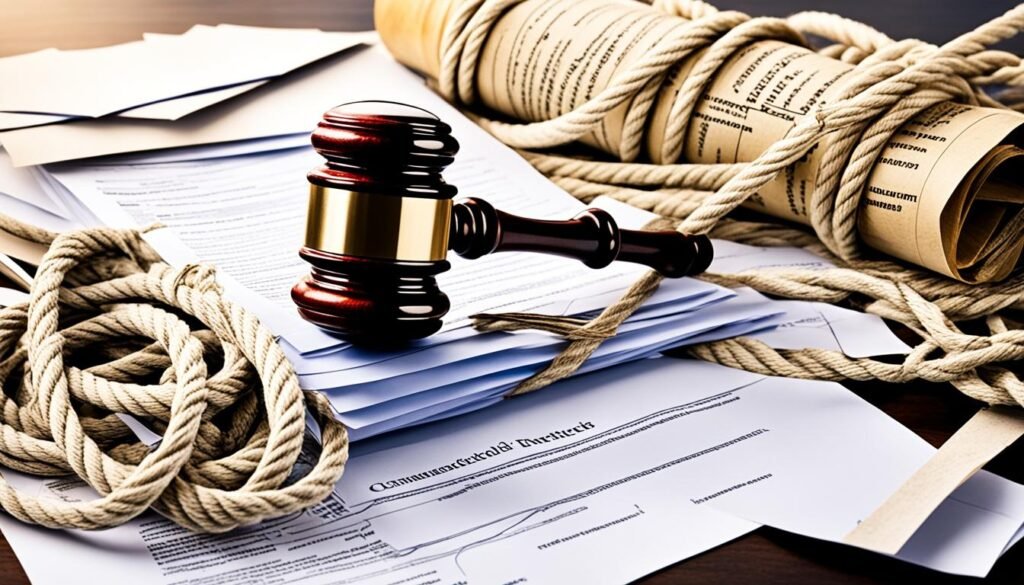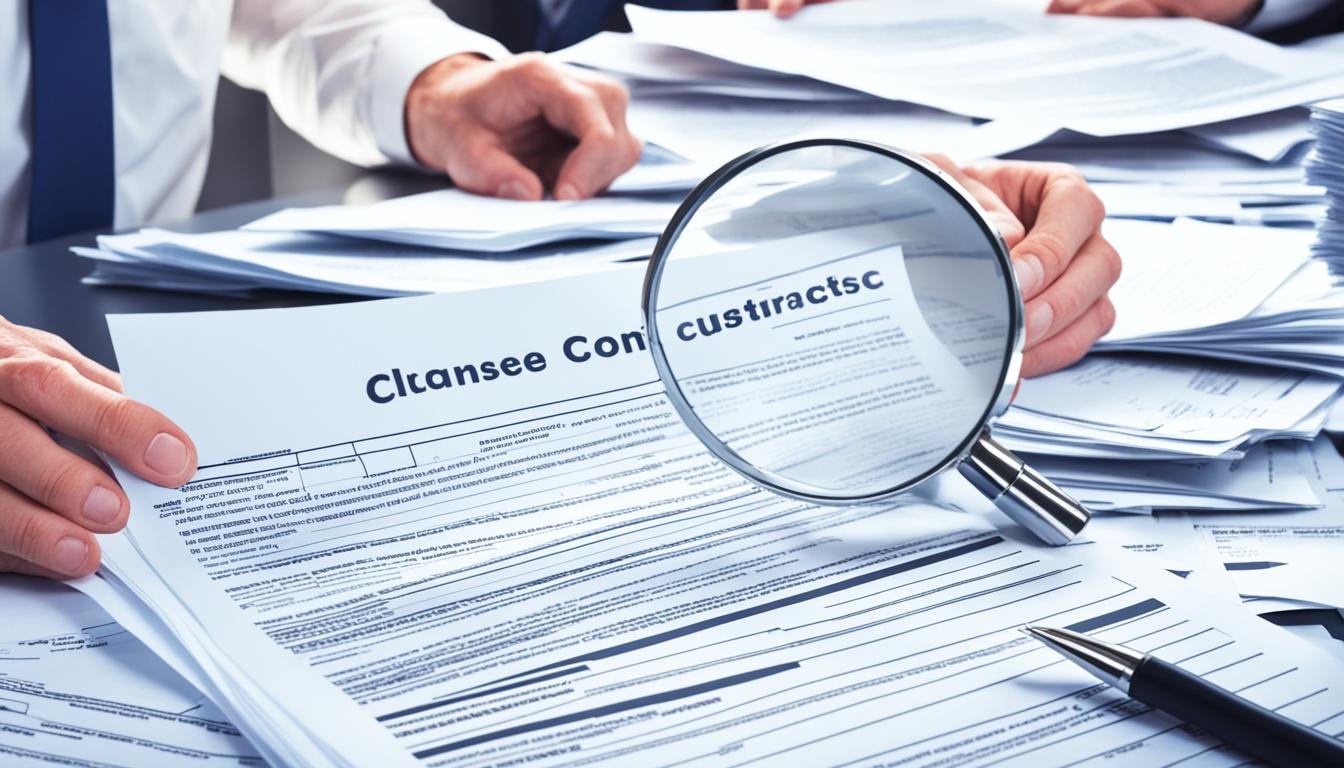Imagine a world where contracts never lead to disputes. A place where business relationships stay smooth and problems are rare. Sadly, in our world, contract disputes are common in business1. In 2019, Apple and Qualcomm had a two-year contract dispute that ended with a huge settlement. This shows how complex and costly these disputes can be, especially in tech1. While we can’t avoid them all, there are ways to lessen their effects. Think of contract management software as your guide through these challenges.
Key Takeaways
- Contract disputes can happen because of unclear terms, breaking the contract, or not meeting duties2.
- In tech companies, 73% of contract disputes are about intellectual property, like patent rights or ownership1.
- Ninety percent of contract disputes are solved through negotiation3.
- Clear contract terms and expectations can help prevent many disputes1.
- Methods like mediation and arbitration can quickly and efficiently solve contract disputes1.
Understanding Contract Disputes
Contract disputes are common in business, happening when parties disagree on a contract’s terms or how it’s being followed4. These issues can harm business relationships and even threaten companies4. It’s important to know the different types of disputes and how to handle them to keep business running smoothly and avoid legal fights.
What Constitutes a Contract Dispute?
A contract dispute can happen when one party doesn’t meet their contract duties5. This includes not doing the job, doing it only partly, doing it late, or saying they won’t do it at all5. Sometimes, it’s about a big or small issue that leads to disagreements on what to do next.
Types of Contract Disputes
- Billing disputes: Arguments over invoices, payments, or fees
- Misrepresentation or fraud: Claims of false or misleading info given during contract talks
- Non-compete violations: Disputes over non-compete clauses
- Indemnification disputes: Arguments over who is liable for damages
- Intellectual property disputes: Conflicts over who owns or can use intellectual property
Handling these disputes needs a careful plan and knowing the law4. Looking at the contract’s rules for solving disputes and getting legal advice helps businesses deal with these tough situations4.

Settling contract disputes often means negotiating, mediating, or sometimes going to arbitration or court5. If talking things out doesn’t work, mediation is another way to go5. Arbitration is a common way to settle disputes outside of court, with the arbitrator’s decision being final5.
“Effective contract dispute resolution requires a strategic and nuanced approach, balancing legal considerations with the practical needs of the business.”
Going to court can take a lot of time and money, and there’s no guarantee of winning5. Getting legal advice before signing a contract can help avoid big disputes later5.
Common contract disputes and resolution strategies
When contract disputes happen, lawyers must navigate complex legal issues. They often go through a process from informal talks to formal steps like arbitration and litigation. To solve these disputes, it’s key to plan well, know what each side wants, and look for ways to compromise6.
Negotiation is a common way to solve contract disputes. It lets the parties talk directly to find a solution they both agree on. Mediation is another method where a neutral person helps the parties understand each other’s issues to find a solution7.
If talking and mediation don’t work, arbitration might be the next step. This is a private way to settle disputes with a neutral person making a final decision. Arbitration is often quicker and more private, with the option to choose experts in the field6.
As a last option, disputes can go to litigation, where a court decides. While it’s a formal way to settle things, it can be long and expensive. Cases can drag on for up to five years because of legal steps and appeals6.
When picking how to solve disputes, it’s important to look at the contract, the nature of the issue, and how it might affect your relationship. Having a plan for dealing with claims can prevent future disputes and save time and money6.
| Dispute Resolution Method | Advantages | Disadvantages |
|---|---|---|
| Negotiation | Direct discussion, mutually agreeable solution | Limited to the parties’ willingness to compromise |
| Mediation | Neutral third-party facilitation, exploration of interests | Non-binding, requires cooperation of both parties |
| Arbitration | Private forum, expedited timeline, expert decision-makers | Potentially costly, non-appealable decision |
| Litigation | Formal, binding resolution | Lengthy process, public record, high costs |
The choice of how to solve disputes can greatly affect the outcome. Knowing the good and bad of each method helps parties make the best choice for their situation6.

“Having a clear plan for addressing construction claims can help parties avoid costly and time-consuming disputes in the future.”
Preventing Contract Disputes
It’s crucial for legal experts to focus on preventing contract disputes8. If contracts lack clear terms, the chance of disagreements grows9. Using clear language in contracts helps avoid confusion. This makes the contract strong and lowers the risk of future problems.
Drafting Clear and Concise Contracts
When writing contracts, aim for clarity and simplicity. Stay away from vague terms or missing details9. Leaving out important parts often leads to disputes. Make sure to outline the work, what needs to be done, when it’s due, and how payment will work. This ensures everyone knows their roles.
Negotiating Carefully
Negotiating contracts well is key to avoiding disputes8. Issues like late work or payments can signal trouble8. If communication breaks down, like ignoring emails or missing deadlines, a dispute might be coming. Negotiate carefully, tackle problems early, and set clear rules for talking throughout the contract.
Also, changes in key people at one party can affect the contract’s success, possibly leading to a dispute8. Think about how stable and reliable your partners are before making a contract.
Using contract management tools, like software, can help prevent disputes by keeping track of contract duties and ensuring they’re met on time8. Ending a contract quickly due to frustration can lead to fines if you don’t check if the contract breach is serious.
By focusing on contract drafting and contract negotiation, legal experts can greatly reduce the risk of disputes and build strong business relationships9. Disputes can harm relationships, waste resources, and take away from business focus. So, preventing them is key in contract management.
“The secret of getting ahead is getting started.” – Mark Twain
Dispute Resolution Mechanisms
When contract disputes happen, there are different ways to solve them. These include negotiation, mediation, and arbitration. Each method has its own benefits and ways of working10.
Negotiation and Mediation
Negotiation is a way to settle disputes without going to court10. It lets the parties talk and try to agree on a solution. Mediation uses a neutral person to help the parties negotiate and reach a settlement10.
Arbitration
Arbitration is a formal way to settle disputes10. It’s different from negotiation or mediation because the arbitrator’s decision is final and legally binding10. This method is often chosen when a clear outcome is needed without the risk of a long court battle10.
| Dispute Resolution Method | Key Features |
|---|---|
| Negotiation | Non-binding, collaborative approach where parties discuss and try to find a mutually acceptable solution. |
| Mediation | Non-binding process involving a neutral third party who facilitates the negotiation between the parties. |
| Arbitration | Binding alternative dispute resolution method with a formal process and a final decision made by an arbitrator. |
The choice of how to resolve a dispute depends on the situation and what the parties prefer10. These methods offer a way to avoid traditional court cases, making it faster and possibly cheaper to settle contract disputes10.
Legal Implications of Contract Disputes
Contract disputes can lead to big legal problems for businesses. They often result in financial losses from legal fees, settlements, and disruptions to work11. These disputes can also harm a company’s reputation, making it harder to attract clients, investors, and partners12. Moreover, they can damage important relationships with partners and suppliers, causing short-term or long-term issues11. Finding new solutions might also be expensive11.
For lawyers, it’s key to understand and prevent these issues when dealing with contract disputes. The13 Contract Disputes Act (CDA) helps with disputes against the government since March 1, 1979. It sets a clear way to solve problems between contractors and government agencies13. If a contractor is unhappy with a decision, they can appeal or sue in the United States Court of Federal Claims (CFC)13.
Dealing with contract disputes means looking at the risks to finances, reputation, and operations12. Knowing the legal side and using good ways to solve disputes can lessen the effects of these conflicts. This helps businesses stay successful in the long run11.
“Resolving a contract dispute can consume a significant amount of time that could otherwise be spent on productive activities, potentially impacting a company’s profitability.”12
| Potential Legal Implications of Contract Disputes | Consequences |
|---|---|
| Financial Losses | Legal fees, settlements, disruptions to business operations1112 |
| Reputational Damage | Deterring potential clients, investors, and partners12 |
| Strained Relationships | Short-term or long-term setbacks with partners and suppliers11 |
| Operational Risks | Need to find costly alternatives11 |
Best Practices for Managing Contract Disputes
Managing contract disputes well means following best practices. Keep detailed records of all talks and deals tied to the contract. This evidence is key in disputes14. Talk often and professionally with the other party to solve problems early and keep a good relationship15. Use contract management software to watch contract progress and spot issues early14.
Maintaining Detailed Records
Keeping good records is key for handling contract disputes. Write down all important talks, like emails and meeting notes. Keep a full record of the contract’s terms, changes, and deals. This record is very important if a dispute happens, showing what happened and when14.
Regular Communication and Monitoring
Talking often and clearly with the other party stops and fixes disputes. Set regular meetings to talk about how the contract is doing, solve problems, and stop issues early15. Also, keep an eye on the contract’s progress and deadlines with software or tools. This way, you can find and fix problems before they get worse14.
| Best Practices for Contract Dispute Management | Benefits |
|---|---|
| Maintaining Detailed Records | Provides crucial evidence in case of disputes |
| Regular Communication and Monitoring | Helps address issues as they arise and fosters a positive working relationship |
| Utilizing Contract Management Software | Facilitates the identification and resolution of potential disputes |
“Effective contract dispute management requires a proactive and collaborative approach, with a focus on maintaining clear communication, detailed records, and continuous monitoring of contractual obligations.”
By using these best practices, you can get better at handling contract disputes. This means less chance of things getting worse and better working relationships1415.
Conclusion
Contract disputes are a common issue in business and law. Knowing the main types of contract disputes helps legal experts handle them better16. By keeping detailed records and talking often, businesses can lessen the damage to their important relationships and interests17.
Managing contract disputes well means having a plan that includes clear contracts, keeping good records, and choosing the right way to solve disputes16. This approach helps legal experts deal with contract disputes confidently. It protects their clients and helps build strong business partnerships18.
As laws change, staying up-to-date and flexible is key to handling contract disputes well. By using the best practices and the right tools, legal experts can help their clients succeed, even with complex contracts16.
FAQ
What constitutes a contract dispute?
What are the common types of contract disputes?
What are the typical steps in the contract dispute resolution process?
How can contract disputes be prevented?
What are the different dispute resolution mechanisms available?
What are the legal implications of contract disputes?
What are the best practices for managing contract disputes?
Source Links
- https://www.spotdraft.com/blog/resolve-contract-disputes
- https://www.pandadoc.com/blog/contract-dispute/
- https://www.top.legal/en/knowledge/contract-dispute-resolution-process
- https://www.rendigs.com/navigating-contract-disputes-key-strategies-for-resolution/
- https://www.linkedin.com/pulse/contract-disputes-guide-resolving-efficiently-speedlegal-iop2c
- https://www.dwt.com/blogs/government-contracts-insider/2024/05/four-dispute-resolution-options-for-contracts
- https://www.pon.harvard.edu/daily/dispute-resolution/what-are-the-three-basic-types-of-dispute-resolution-what-to-know-about-mediation-arbitration-and-litigation/
- https://gowlingwlg.com/en/insights-resources/articles/2023/top-10-tips-for-managing-contractual-disputes/
- https://www.communitylawfirm.com/effective-strategies-avoiding-contract-disputes
- https://linkilawsolicitors.com/dispute-resolution/dispute-resolution-methods-resolving-contract-disputes/
- https://www.stirklaw.com/guides/strategies-to-avoid-and-resolve-contract-disputes-with-suppliers
- https://cmigroup.com.au/how-do-you-resolve-a-dispute-in-a-contract/
- https://www.justice.gov/jm/civil-resource-manual-70-contract-disputes-act
- https://www.pon.harvard.edu/daily/dispute-resolution/in-contract-negotiations-agree-on-how-youll-disagree/
- https://www.okbar.org/freelegalinfo/disputes/
- https://www.gatekeeperhq.com/blog/managing-contract-disputes
- https://carbonlg.com/contract-disputes-strategies-for-resolution-and-avoidance/
- https://learn.aiacontracts.com/articles/effective-dispute-resolution-strategies-in-construction-contracts/

